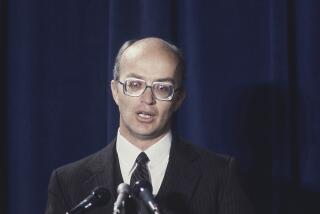ABM Treaty Mischief Earns Reaganites Another Rap
The Reagan Administration has had its knuckles rapped--and rapped hard--for some underhanded business that is every bit as damaging to the nation’s interest as is the Iran- contra affair. This time the disciplinarian was not someone taking secret pleasure in humiliating the White House. It was the chairman of the Senate Armed Services Committee, Sam Nunn, a Democrat with a reputation for conservatively sympathetic thinking on most arms issues. But last week Nunn found the Administration guilty of trying to twist the 1972 anti-ballistic-missile treaty to its own political purpose: to give it a new, broad reading that would help “Star Wars” to survive after Ronald Reagan leaves office.
The Iran-contra scheme happened because people in the White House tried to give the President what he wanted, by hook or by crook, rather than telling him the facts of life. A similar zeal explains the attempted mauling of the ABM treaty. This time the institution tarnished is not the presidential household, presumed to be partisan, but a body with a precious reputation for probity: the Department of State.
The plot began with civilian leaders in the Pentagon who are worried that the next President will be less emotionally committed to the Strategic Defense Initiative. They want a deployment commitment while Reagan is still in office, but first there has to be testing of the exotic new weapons, which the ABM treaty prohibits. They might have simply renounced the treaty, but that would brand the Reagan Administration as irrevocably hostile to arms control. Far better to reinterpret what the treaty means.
The task of putting lawyer’s clothing on this clever dodge fell to the State Department. Specifically, its legal adviser, Abraham D. Sofaer, was charged with preparing a brief that would make the treaty mean the opposite of what it says. Perhaps Secretary of State George P. Shultz and his deputies wanted to prove that they are on the Reagan team. Perhaps they wanted to head off even worse anti-ABM mischief. In any event they took the lead in promoting a canard.
Particularly because of last October’s Reykjavik summit meeting, which produced grave doubts about Reagan’s understanding of elementary nuclear issues, recent efforts to promote a “broad” interpretation of the ABM treaty produced an intense outcry. The European allies expressed distress and astonishment over American legal legerdemain. And Nunn, hardly known for rhetorical excess, predicted a major constitutional crisis if the Administration acted without consulting Congress.
Nunn did more than study the treaty; he found copious and in most cases clear evidence of what most of its U.S. negotiators thought they were doing in 1972, what the Nixon Administration told the Senate at the time, and how the United States and the Soviet Union have regarded the treaty in the intervening 15 years. On all three counts, Nunn rebuked the State Department for shoddy and misleading analysis.
Nunn found Sofaer (a former federal judge) and his colleagues not just to be wrong, but to have made a “complete and total misrepresentation” of some aspects of the record. They had been “ideologically driven” and had followed “fundamentally flawed” procedures. And they had engaged in an “amazing sort of legalistic gymnastics.” This was no shot across the bow, but a broadside that both exploded the State Department’s case and put a hole in its most valued asset: its credibility.
In response, Sofaer mimicked Reagan’s Iran-contra defense, blaming his lapse of judgment on subordinates--on “younger lawyers.” The implication was clear: Until they were caught out, neither Sofaer nor State’s front office thought to question the validity of arguments that struck at the heart of this nation’s key arms-control treaty.
Here two ironies emerge: Nunn exposed a sorry venture that risked putting the United States on the same moral plane, regarding adherence to treaties, that hardliners ascribe to the Soviet Union.
Meanwhile, the secretaries of state and defense were somehow persuading the President to confess in his weekly radio talk that he had failed them in the Iran-contra affair--and not the other way around. At the same time, they were abetting chicanery of equal import in their own departments.
To each of them Nunn was saying, in effect, “Physician, heal thyself.”
More to Read
Get the L.A. Times Politics newsletter
Deeply reported insights into legislation, politics and policy from Sacramento, Washington and beyond. In your inbox three times per week.
You may occasionally receive promotional content from the Los Angeles Times.










